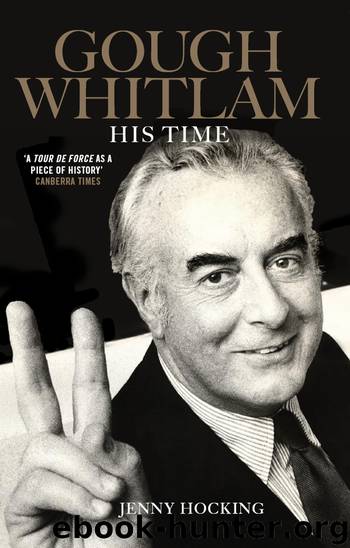Gough Whitlam by Jenny Hocking

Author:Jenny Hocking
Language: eng
Format: epub
ISBN: 9780522862157
Publisher: Melbourne University Publishing
10
THE THIRD MAN
As he will be in the shades of history when this is read, his role should be known.1
—John Kerr
EARLY ON TUESDAY morning, 11 November 1975, Clarrie Harders was in his Canberra office reading the daily newspapers. A brief item under ‘Vice-Regal News’, usually warranting no more than a cursory glance, interrupted his quiet routine:
His Excellency the Governor-General received the Right Honourable Sir Garfield Barwick, Chief Justice of Australia, at Admiralty House, Sydney, yesterday morning. Later the Governor-General entertained the Chief Justice at luncheon at Admiralty House.2
Harders was shocked. He read the notice again, momentarily puzzled. The Governor-General, Sir John Kerr, had met the Chief Justice in Sydney the previous day—twice—and yet the Prime Minister knew nothing about it.3 This was the first indication for Harders of the existence of a parallel narrative—one of secret meetings, confidential exchanges and private agreements—that had developed over the previous months and of which he, like the Prime Minister, had been completely unaware. The meetings between Kerr and Barwick on 10 November 1975 had not only been held in secret from the Prime Minister, they had been held in defiance of him and his explicit and unqualified advice to the Governor-General weeks earlier that he not meet with the chief justice. The significance of this was absolute. Harders, the career public servant with an untroubled commitment to established procedure, official channels and institutional propriety, could see at once that the fundamental presumptions of formal governmental power had been undermined, that government had been compromised and ultimately usurped by the elevation of unofficial power beyond even the Prime Minister. It was this that shocked Harders: the repudiation of the Prime Minister and his government had reached the highest levels.
Sir John Kerr had been Governor-General for just eight months when, in March 1975, he approached the vice-chancellor of the Australian National University with a confidential request. Kerr put forward an unusual proposition—the formation of a group within the university to meet with him, in confidence and without the knowledge of the Prime Minister, and to advise him on the nature and extent of his powers as Governor-General.4 Kerr did not inform Gough Whitlam that he had sought advice from this hand-picked advisory group—or indeed that he harboured any doubts regarding his role and powers—and Kerr never revealed the role played in the formation of this group by its most senior judicial figure, Sir Anthony Mason. Mason was at that time a sitting justice of the High Court of Australia, and a pro-chancellor of the ANU. He and Kerr had been ‘close personal friends’ since Mason first appeared as a junior counsel to Kerr in the 1950s,5 and it was Mason who drove the discussions with Kerr on the establishment of this advisory group, conferring directly and confidentially with the Governor-General about ‘constitutional problems’.6
Kerr’s request for confidential advice posed ‘some difficulty’ for Justice Anthony Mason, since the matters that this group was likely to consider were those same controversial political and legal points currently the subject of intense political debate and that were also likely to come before the High Court.
Download
This site does not store any files on its server. We only index and link to content provided by other sites. Please contact the content providers to delete copyright contents if any and email us, we'll remove relevant links or contents immediately.
| Arms Control | Diplomacy |
| Security | Trades & Tariffs |
| Treaties | African |
| Asian | Australian & Oceanian |
| Canadian | Caribbean & Latin American |
| European | Middle Eastern |
| Russian & Former Soviet Union |
The Secret History by Donna Tartt(19088)
The Social Justice Warrior Handbook by Lisa De Pasquale(12190)
Thirteen Reasons Why by Jay Asher(8910)
This Is How You Lose Her by Junot Diaz(6887)
Weapons of Math Destruction by Cathy O'Neil(6280)
Zero to One by Peter Thiel(5802)
Beartown by Fredrik Backman(5754)
The Myth of the Strong Leader by Archie Brown(5507)
The Fire Next Time by James Baldwin(5446)
How Democracies Die by Steven Levitsky & Daniel Ziblatt(5218)
Promise Me, Dad by Joe Biden(5153)
Stone's Rules by Roger Stone(5088)
A Higher Loyalty: Truth, Lies, and Leadership by James Comey(4964)
100 Deadly Skills by Clint Emerson(4925)
Rise and Kill First by Ronen Bergman(4789)
Secrecy World by Jake Bernstein(4753)
The David Icke Guide to the Global Conspiracy (and how to end it) by David Icke(4720)
The Farm by Tom Rob Smith(4511)
The Doomsday Machine by Daniel Ellsberg(4490)
